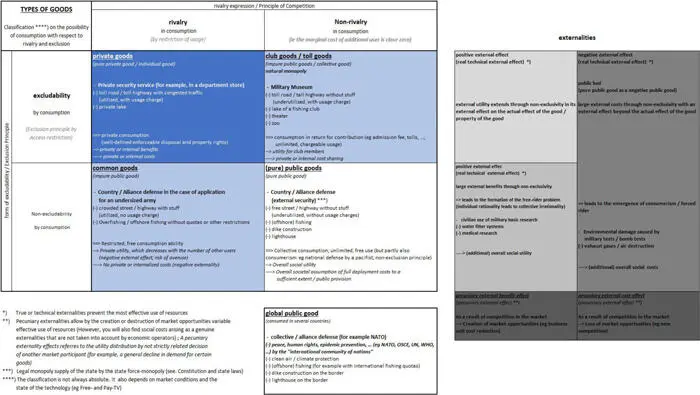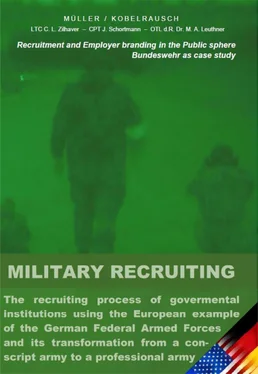Globalism presents a particular kind of public good that result from the abolition of national (trade) borders and the international interdependence through alliances and agreements. Seen from a worldwide perspective, a nation-state public good is supranational. Therefore, it must be considered as an asset of global public importance due to its global supranational external benefits which taken alone nationally, would also be subject to the issue of public goods. Its efficient provision therefore requires not only national efforts but also a “global public Good 15“.
Political preferences as to what extent and in what ways global public goods should be provided across countries, require a global-normative approach and involvement within the international community. For example, the interim report (2005) of the "International Task Force on Global Public Goods” suggested in addition to international protection goods such as forests, oceans, etc. a responsible international guarantee of the five key global public goods:
- Control of communicable diseases,
- Free trade,
- Knowledge,
- Financial stability and
- Peace and security.
In the context of this work, international peace and security are treated as a global public good, sometimes referred to as international peacekeeping.

Figure 2: Public goods in conflict with private goods, externalities and global public goods
2.2.2. Problem
The problem of provision of (global) public good security in the form of state / collective defense arises from the non-exclusivity due to its large external benefits for all individuals. In market terms, not all users of this good would be willing to pay for its investment and maintenance costs. The problem of collective 16by using public goods arises from an incentive problem: individuals who are not providing any contribution can still acquire the benefits of the goods, because they cannot be effectively excluded from using them. It is called the "free rider problem". Consequently, external security is not, or not to a sufficient extent, provided by private companies on the market 17. Therefore, in case of a public goods market failure, state intervention is necessary. A provisional improvement (see also Pareto improvement) of the overall social welfare as a sufficient condition for state intervention applies to public goods such as external security. Figure 3 (Holler and Illing, 2005) illustrates the game-theory approach for non-excludability and the free rider problem with a simple example in table form.

Figure 3: Prisoner's dilemma
This simple example is the so-called "prisoner's dilemma 18". Neither individual A nor B contributes to the provision of the public good of external security, even though both would be better off if everyone would contribute to the provision. The dominant strategy of both individuals is not contributing, so that the Nash 19Equilibrium in a Payoff from "0 ; 0" prevails. If both cooperate and contribute, the payoff would be "1.5 ; 1.5", so the state intervention and state provision of public good is justified. This example can be applied with modifying " contribute - not contribute " to " peace - war & military - no army " or " neighbor has no army - neighbor has an army and having no army - having its own army ".
The "free rider problem", the central issue for the provision of goods with large external benefits remains: welfare optimization cannot be solved without State intervention and the provision of public goods through the collection of compulsory levies cannot be solved welfare optimal (see Beck, 2011). Several further problems arising are public debt, crowding out, rent-seeking, etc. These will not be discussed here further.
For this study, the preceding consideration of goods deployment justifies the legitimacy of the government providing the "public good Bundeswehr" because it fulfills the task of implementation and deployment of "(external) security" for Germany.
2.3 The provision of „security “
2.3.1 The term „security “
The term security is generally understood as the state of safety, the managed protection from danger and damage, as well as the highest possible exemption of hazards. In the military context it is often associated with peace or the absence of war, although this expression could theoretically range from a world full of pacifists to a world full of police states with the potential threat of total mutual destruction at any time. From a more realistic viewpoint, national security has the prevention and protection measures to maintain fundamental and human rights in their respective scope. Political decision-making processes on both national and international level dictate how to act socially appropriate. The concepts of safety and security relevance have substantially changed and expanded over time. Security can be divided in four different dimensions:
- Reference dimension,
- Material dimension,
- Space dimension and
- Danger dimension 20
With respect to the reference dimension, the State and the protection of State sovereignty is no longer the primary reference object. Rather, the safety of the society and its individuals should be guaranteed. Here, security is assumed as a precondition of a free and self-determined life, which has to be provided by the State for its citizens.
In the material dimension, in addition to the military and police security components, the political components of economic, environmental and human security are considered due to the increasing globalization.
Regarding the space dimension in its geographical framework, a similar change in security aspects took place through military and economic alliances (see also globalization). Security is no longer a political issue exclusively on the national level, but also on regional, international and global level. Therefore, security is a "global public good".
The danger dimension analyzes the potential hazard or potential disruption of security. After the end of the Cold War and the disappearance of specific threats, potential conflicts today have become somewhat unclear and difficult to define and often depend on ideological or economic conditions. These potential conflicts are frequently asymmetrical and often predict that a little and often completely unknown aggressor will have the advantage of surprise against State security structures. A selective social vulnerability is brought to the fore and a "war of nations" has become unlikely. Due to the different dimensions and their complexity and interaction, the term safety becomes a complex issue that goes far beyond trivial black and white thinking. (see Stuchtey et al., 2013, and Daase et al., 2013).

Figure 4: Procedural representation of a State conflict prevention strategy
This is also reflected in the thought-provoking impulse by General a.D. Schneiderhan (2013) to bolster the reserve forces. As he confirmes, security has become far more complex and cannot be guaranteed in a battle as seen formerly, but can only be achieved by mitigating the permanent threat of attack. Conflicts no longer take place on the battlefield, but through attrition. Whoever is wealthy nowadays can potentially provide all that is necessary for the use of violence.
Читать дальше















